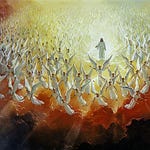God’s Fatherhood
Many dismiss the image of God the Father as an old man with a beard. The Father is not a male human being, true. In reality, God the Father transcends male and female: he is pure spirit and therefore has no corporal body. But the image of God the Father by Michelangelo on the ceiling of the Sistine Chapel does convey a great deal. While he holds Eve tenderly, close to his heart, he is reaching out his finger to give life to Adam.
This painting vividly portrays God as he appears in Deuteronomy 1:31, as a loving father who carries his child Israel along the way. It conveys one of the main meanings of the fatherhood of God: not only is God the origin of all being, possessing transcendent authority, but he also has the compassion and tenderness of a father for his children.
Psalm 103:13 Just as a father who loves his children, so the Lord loves those who fear and worship Him with awe filled respect and deepest reverence.
He is, as Paul says, the “Father of mercies and God of all comfort” (2 Corinthians 1:3) who “chose us in Christ before the foundation of the world … and destined us in love to be his sons” (Ephesians 1:4-5).
In Aramaic and Hebrew, the informal, familiar form of address for one’s father, used both by young and adult children, is Abba. But for a Jew to address God as Abba in prayer was unheard of in ancient Israel. It would have struck a Jew as irreverent and presumptuous. Not not only did Jesus address God this way in the Garden of Gethsemane, but he taught his disciples to do the same.
“And he said, “Abba, Father, all things are possible to you; remove this chalice from me; yet not what I will, but what you will. - Mark 14:36
We can further grasp the importance of the word Abba to the early Christians by the several places where Mark and Paul, who wrote in Greek, remembered and preserved the word in the original Aramaic form that Christ spoke.
Jesus is the only begotten Son of God. Only he, by nature, can call God Abba. We dare to do likewise only because he has shared his sonship with us by his grace. He has allowed us to share his vision and experience of God from the vantage point of beloved sons and daughters. Walking in faith thus means walking as brothers and sisters in Christ, sons and daughters of the one Father, our Father.
We are to become like little children, and place ourselves in relationship with God not as his slaves but as his children. And not his adult children who are self-sufficient and have their parents at arm’s length.
His little four-year-old children, completely dependent, vulnerable, and trusting.
If you find this hard to grasp, you are not alone. In the time of Jesus, it was extremely difficult, scandalous even, for the Jewish people to think of addressing God so informally.
This sort of intimacy and familiarity with God was unprecedented, and it is unique among the great religions of the world. To this day, the most common form of address for God that Jews use in prayer is “Lord Our God, King of the Universe.”
This is the character of our “Abba” Father—a God who relentlessly pursues us and wants a deep and intimate relationship with us. He wants to bridge every gap or chasm between him and us, to know us completely and love us unconditionally.
Keep Your Love on Friends!
Love Always, Lindsay Rose 🌹













Share this post